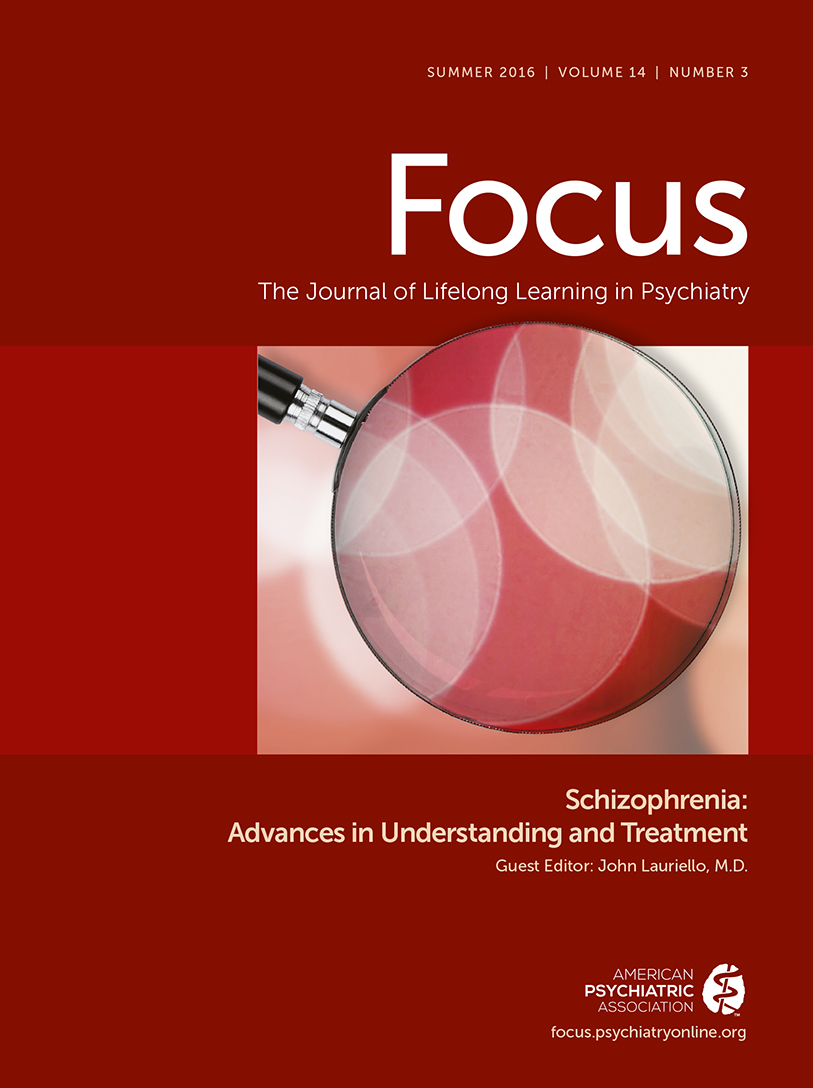Schizophrenia: Advances in Understanding and Treatment
In 2004, I served as the guest editor for the Focus issue on schizophrenia; now, a decade later, I am honored to once again oversee an issue on the same topic. As I executed this task, I reflected on how much has changed or, in some cases, not changed in the intervening years. In 2004, Jibson et al. wrote a comprehensive review of schizophrenia for our issue (1). Today, nearly all of their topic sections would need to be revised to reflect everything from the elimination of the schizophrenic subtypes in DSM-5, to the advances in genetics and brain imaging, to the remarkable growth in the number of available antipsychotics, including a number of second-generation long-acting injectables.
Psychosocial treatments were emphasized in 2004, although the evidence has not been wholly embraced by providers and their use is often discouraged by payers. Recent seminal studies, like the National Institute of Mental Health’s Recover After an Initial Schizophrenia Episode (RAISE) early treatment program, have shown that medication alone (treatment as usual) is inferior to a more comprehensive, multidisciplinary team–based approach of medication and psychosocial supports (2). A decade ago, the concept of cognitive remediation was the purview of traumatic neurologic illnesses; now, it is being critically used and investigated for less radiographically or electrophysiologically overt illnesses like schizophrenia (3).
In 2004, I coauthored the Focus lead article on the first interview of patients with psychosis. We discussed how to evaluate symptoms, develop a differential diagnosis, and form an initial treatment plan (4). In retrospect, that article remains current and applicable, needing only minor updating. A diagnosis of schizophrenia still largely rests on the history and interview. Advances in the field include attempts to merge imaging, genetic, and neurophysiologic measures, with the aim of confirming the diagnosis and better predicting prognosis. We have been teaching medical students and residents for years that schizophrenia is most likely a number of disorders (phenotypes) grouped into a common nomenclature. We are on the verge of being able to prove that these disorders exist as distinct entities. The implications of these findings are significant. Distinct illness patterns may require distinct category-based treatment interventions. We see this now in the individualized treatment of cancer. In the next 10 years, we may see it transform the treatment of psychiatric illnesses, including schizophrenia. The 2025 Focus issue on schizophrenia will undoubtedly include those advancements. I hope to once again have the honor of reporting them.
1 : Schizophrenia and other psychotic disorders. Focus 2004; 2:17–30Link, Google Scholar
2 : Comprehensive versus usual community care for first-episode psychosis: 2-year outcomes from the NIMH RAISE early treatment program. Am J Psychiatry 2016; 173:362–372Crossref, Google Scholar
3 : Feasibility and pilot efficacy results from the multisite Cognitive Remediation in the Schizophrenia Trials Network (CRSTN) randomized controlled trial. J Clin Psychiatry 2012; 73:1016–1022Crossref, Google Scholar
4 : The first interview of a patient with psychosis: symptoms safety and stabilization. Focus 2004; 2:7–12Abstract, Google Scholar



